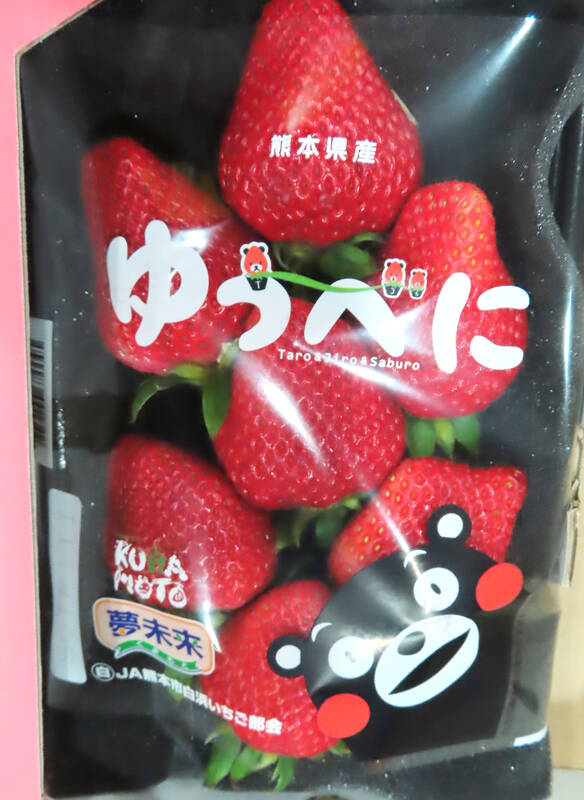A 472kg shipment of strawberries from Japan that was recently stopped at the border due to excessive pesticide residue would have been legal under relaxed limits that took effect on Monday.
The shipment was seized on March 14 after traces of flonicamid, an insecticide, were found at a concentration of 0.02 parts per million (ppm), the Food and Drug Administration (FDA) said in a weekly report.
Before Monday, the maximum residue limit for flonicamid on strawberries was zero.

Photo courtesy of the Food and Drug Administration
From June 1 last year, strawberries from Japan have been subject to batch-by-batch border inspections after repeatedly failing FDA testing, mainly due to excessive pesticide residue. That ends on April 30.
FDA Deputy Director-General Lin Chin-fu (林金富) yesterday told a news briefing that from Sept. 25 last year through Monday last week, 31 of the 767 shipments of Japanese strawberries that arrived in Taiwan, or 4.04 percent, did not meet safety standards and were confiscated.
In light of these infringements, the FDA would continue batch-by-batch inspections of Japanese strawberries for an unspecified period after April 30, and would continue to impose one-month bans on Japanese firms that contravene regulations, Lin said.
In late January, the FDA announced a proposal to relax restrictions on flonicamid and three other pesticides — acequinocyl, chlorfenapyr and mefentrifluconazole — which are commonly used by strawberry growers in Japan.
Taiwan had previously set residue limits for use of the four pesticides on a range of other crops, but not for strawberries.
Under the FDA’s new rules, which took effect on Monday after public feedback was collected for a 60-day period, the maximum residue limits were set at 1ppm for acequinocyl, 0.5ppm for chlorfenapyr, 0.7ppm for flonicamid and 1.5ppm for mefentrifluconazole.
Other seized items in this week’s FDA food safety report included a 72 tonne shipment of Indonesian mung beans, 2,904 tonnes of yams from China and 3.363 tonnes of frozen northern snakehead fish from Vietnam.
All the seized items were either destroyed or sent back to their country of origin, the FDA said.

Taipei has once again made it to the top 100 in Oxford Economics’ Global Cities Index 2025 report, moving up five places from last year to 60. The annual index, which was published last month, evaluated 1,000 of the most populated metropolises based on five indices — economics, human capital, quality of life, environment and governance. New York maintained its top spot this year, placing first in the economics index thanks to the strength of its vibrant financial industry and economic stability. Taipei ranked 263rd in economics, 44th in human capital, 15th in quality of life, 284th for environment and 75th in governance,

The Sports Administration yesterday demanded an apology from the national table tennis association for barring 17-year-old Yeh Yi-tian (葉伊恬) from competing in the upcoming World Table Tennis (WTT) United States Smash tournament in Las Vegas this July. The sports agency said in a statement that the Chinese Taipei Table Tennis Association (CTTTA) must explain to the public why it withdrew Yeh from the WTT tournament in Las Vegas. The sports agency said it contacted the association to express its disapproval of the decision-making process after receiving a complaint from Yeh’s coach, Chuang

Control Yuan Secretary-General Lee Chun-yi (李俊俋) tendered his resignation last night, admitting that he had misused a government vehicle, as reported by media. His resignation was immediately accepted by the Control Yuan. In a statement explaining why he had resigned, Lee apologized for using a Control Yuan vehicle to transport his dog to a pet grooming salon on May 20. The issue first came to light late last month, when TVBS News reported that Lee had instructed his driver to take the dog to the salon. The news channel broadcast photos that it said were taken by an unnamed whistle-blower, which purportedly showed the

A former officer in China’s People’s Liberation Army (PLA) who witnessed the aftermath of the 1989 Tiananmen Square massacre has warned that Taiwan could face a similar fate if China attempts to unify the country by force. Li Xiaoming (李曉明), who was deployed to Beijing as a junior officer during the crackdown, said Taiwanese people should study the massacre carefully, because it offers a glimpse of what Beijing is willing to do to suppress dissent. “What happened in Tiananmen Square could happen in Taiwan too,” Li told CNA in a May 22 interview, ahead of the massacre’s 36th anniversary. “If Taiwanese students or